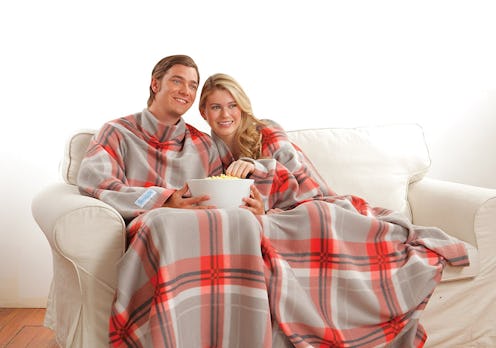Life
If You Bought A Snuggie Or These Other Products, You Could Be Eligible For A Refund
I should probably be embarrassed about this, but here goes: I bought a Snuggie years ago, and I still use it without shame. All of my friends made fun of the brand's over-the-top commercials, but I'm always cold, and a blanket with sleeves seemed genius. But my beloved Snuggie is facing some heat from the Federal Trade Commission: According to the FTC, Allstar Marketing Group, LLC, a company that specializes in direct marketing products like the Snuggie, ran buy-one-get-one promotions that were "deceptively marketed." So, if you've ever gotten lured in by late-night infomercials and bought a product like the Snuggie, you could be eligible for a refund.
Other products include Magic Mesh Door (an automatic mesh door that's supposed to keep bugs out), Cat’s Meow (an electronic pet toy), Roto Punch (a heavy duty hole puncher) and, of course, the Snuggie. The Federal Trade Commission's official statement says Allstar Marketing Group is paying customers more than $7 million to settle a lawsuit related to its allegedly deceptive marketing practices. Here's an excerpt:
The Federal Trade Commission is mailing 218,254 refund checks totaling more than $7.2 million to people who bought products deceptively marketed as “buy-one-get-one-free,” including Snuggies, the Magic Mesh Door, and other “as-seen-on-TV” type products. Consumers who bought products marketed by Allstar Marketing Group, LLC will receive checks averaging $33.14.
I'm all about a deal, so any buy-one-get-one advertisements always catch my eye — but the hidden fees that come with those promotions can make them less cost-effective than meets the eye. According to the FTC, Allstar allegedly tacked on extra shipping fees and made it confusing for customers to understand how many products they were buying, which led to people being charged more than expected. A press release shared when the company agreed to an FTC settlement in 2015 dives deeper into what happened. Here's an example:
While consumers were led to believe that they would then be getting two $19.95 products for 'less than $10 each,' in fact, the total cost with the undisclosed $7.95 'processing and handling' fees jumped from the advertised price of $19.95 to $35.85, according to the complaint.
As alleged in the FTC’s complaint, consumers who called Allstar were often immediately instructed to enter their personal and billing information, and were charged for at least one 'set' of products, based on the 'buy-one-get-one-free' offer, before they had a chance to indicate how many products they wanted to buy. Because the sales pitch was often confusing, some consumers purchased more 'sets' than they actually wanted.
Basically, when people were ordering on the phone, they ended up getting charged more than they should have, because the charges were misleading. But even customers who didn't order via phone were allegedly duped: According to the FTC, some of the Allstar-owned products included processing fees in hard-to-read print at the bottom of the checkout page, so customers didn't realize how much they were actually paying until it was too late.
If you're owed money because of this settlement, you'll receive a check within the next month. The FTC says to contact the consulting group handling the refunds if you have questions about the process.
The case is a reminder to be wary of ridiculously good deals. If it seems too good to be true, it probably is. I bought my Snuggie in-store at my university bookstore, so I didn't have to deal with any of the marketing tactics that other consumers may have faced. But if you've ever been duped by a company, it may be a good idea to give the FTC a heads up about it.
